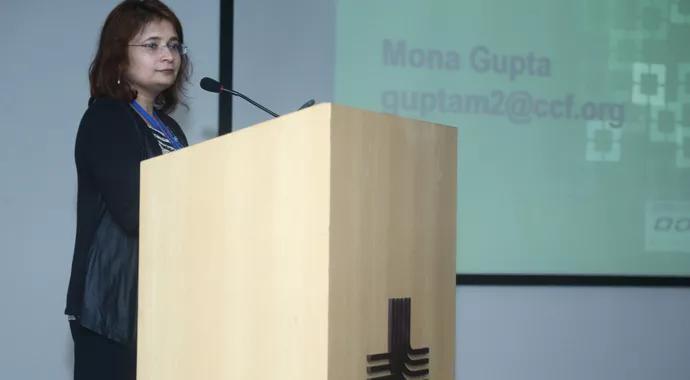Many countries have significant obstacles

More people with advanced, life-threatening illnesses are living longer, making the need for palliative care an important public health concern.
Advertisement
Cleveland Clinic is a non-profit academic medical center. Advertising on our site helps support our mission. We do not endorse non-Cleveland Clinic products or services. Policy
Recently, Mona Gupta, MD, of Cleveland Clinic’s Department of Hematology and Medical Oncology and the Center for Connected Care was invited by Ashok Vaid, MD, Chairman of Medical Oncology and Hematology at the Medanta Cancer Institute in Gurgaon, India, to deliver a lecture on palliative care in oncology.
Dr. Gupta is co-chair of palliative care for the Indo-American Cancer Association, a non-profit charitable organization with a mission to advance access to, educate and advocate for better cancer care and treatments in India. Developing palliative care in India is one of the organization’s major initiatives.
During her visit, Dr. Gupta spoke to oncologists and surgeons about the concept of palliative medicine, patient needs, and how to establish palliative medicine within physicians’ clinical practices. “The primary goal of the conference was establishing a palliative medicine department at the Medanta Cancer Institute that seeks to relieve suffering in all stages of disease, not simply limited to comfort care or end-of-life care,” she says.
Additionally, Dr. Gupta was invited to speak at the International Neonatal and Pediatric Nephrology Training Workshop, where she discussed the care of terminally ill patients, with a special emphasis on palliative care. “I worked to develop the concept of palliative care in the context of nephrology and spoke to a number of stalwarts in the field of nephrology,” says Dr. Gupta.
Dr. Gupta and her colleagues in India aim to initiate collaboration between Medanta and Cleveland Clinic to establish palliative care at the cancer institute. This represents a new venture, as physicians practicing in the traditional medical treatment model in India provide curative or aggressive treatment initially and only offer comfort care when other measures have failed.
Advertisement
An American Society of Clinical Oncology provisional clinical opinion (PCO) recommends that treatment teams consider combined standard oncology and palliative care early for any patient with metastatic cancer or high symptom burden. “This PCO addresses the integration of palliative care services into standard oncology practice at the time a patient is diagnosed with metastatic or advanced cancer,” Dr. Gupta says.
“Palliative care at Medanta will focus primarily on anticipating, preventing, diagnosing and treating symptoms that patients experience with a serious or life-threatening illness, as well as helping patients and their families make medically important decisions,” she says.
Dr. Gupta will continue to work with the comprehensive team at Medanta to provide palliative care that emphasizes aggressive symptom management and psychosocial support.
“This joint venture, supported by Matt Kalaycio, MD, Chairman of Cleveland Clinic’s Department of Hematology and Medical Oncology, will help increase international awareness of palliative medicine and meet the growing need for this updated medical model,” she says.
Dr. Gupta says she learned some valuable lessons during her visit to India, including:
Advertisement
Societal beliefs as well as limited experience and training, inadequate health care access and poorly crafted government policies regarding end-of-life care have hindered the establishment of palliative medicine in developing countries.
Dr. Gupta says the lack of essentials such as opioids and other pain medications, or radiotherapy, creates substantial challenges for the medical community in these areas to achieve the most basic of palliative care goals — to relieve pain and suffering and prevent functional impairment.
Dr. Gupta delivers her lectures to achieve her ultimate goal of helping other medical organizations develop a palliative care model that improves quality of life for patients and families, regardless of diagnosis.
Dr. Gupta is a physician in Cleveland Clinic’s Taussig Cancer Institute Department of Hematology and Medical Oncology and Center for Connected Care, and Assistant Professor of Medicine at Cleveland Clinic Lerner School of Medicine, Case Western Reserve University. She was also recently elected as co-chair of the Indo American Cancer Association and mentor for the 2015 Mentoring Program at the American Geriatric Society’s Annual Scientific Meeting in May.
Advertisement
Advertisement

First-of-its-kind research investigates the viability of standard screening to reduce the burden of late-stage cancer diagnoses

Global R&D efforts expanding first-line and relapse therapy options for patients

Study demonstrates ability to reduce patients’ reliance on phlebotomies to stabilize hematocrit levels

A case study on the value of access to novel therapies through clinical trials

Findings highlight an association between obesity and an increased incidence of moderate-severe disease

Cleveland Clinic Cancer Institute takes multi-faceted approach to increasing clinical trial access 23456

Key learnings from DESTINY trials

Overall survival in patients treated since 2008 is nearly 20% higher than in earlier patients